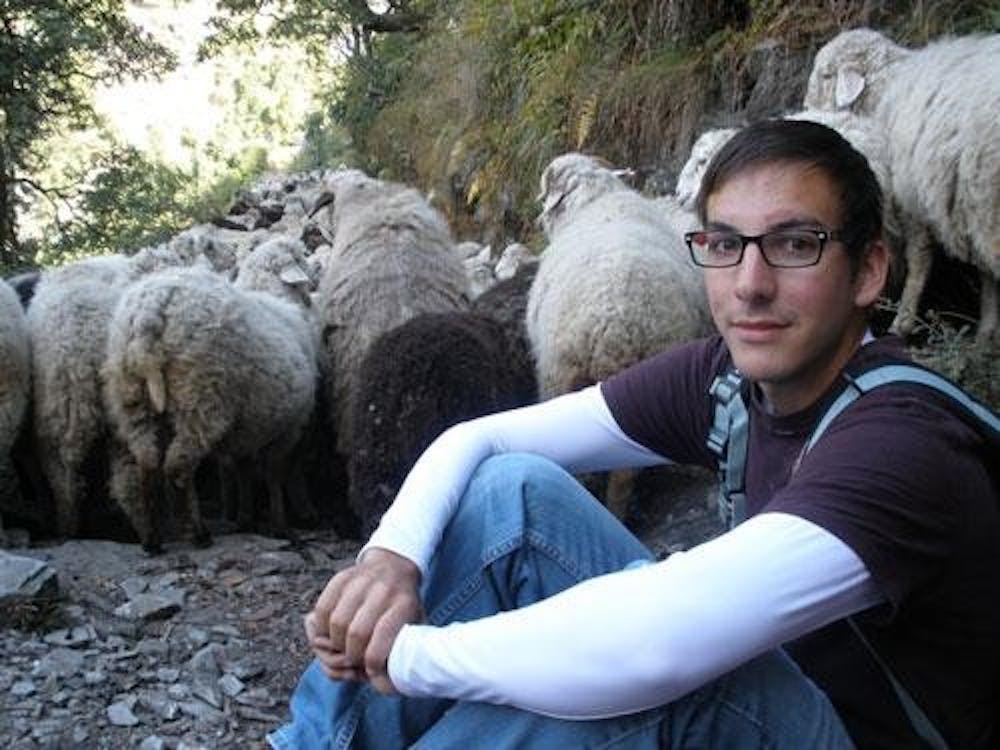
Bradford Kasberg encounters sheep while studying abroad in India. Kasberg won Miami Uiversity’s 2012 Joanna Goldman Memorial Prize and will carry out environmental tests on Miami tribal lands near Miami, Okla. (SAM KAY | The Miami Student)
This time of year, many graduating seniors are uncertain about their future, looking for jobs or nervously waiting to hear back from graduate schools. Senior Bradford Kasberg is not one of them.
He is the winner of the 2012 Joanna Goldman Memorial Prize, given to a graduating senior to "complete a dream research, service or creative project."
The prize, administered by the Miami University Honors Program, is currently valued at $30,000.
Kasberg's project to carry out environmental tests on Miami tribal lands in Ottawa County, Okla. is at the nexus of his undergraduate majors – anthropology and geography – and is personal for him on many levels.
Kasberg is a Miami Indian and since 2010 has been involved in the Myaamia Project on campus. Founded in 2001 and headed by Daryl Baldwin, the project is dedicated to the language and cultural revitalization of the Miami Tribe.
"I am a Miami Indian, but I grew up not knowing much about the culture or anything, so the [Myaamia] project helped me learn about my tribe," Kasberg said.
Advised by geology professor Jason Rech, Kasberg will spend the year after graduation investigating whether lead, zinc and cadmium from the Tar Creek Environmental Protection Agency Superfund site – located adjacent to Miami lands – has contaminated soil, water and crops that are significant to the tribe.
"If the mining has destroyed the landscape and we are an ecologically-based culture, then the mining has, in a sense, damaged our culture," Baldwin said.
Kasberg will be testing plants important to Miami culture that might be ingested or otherwise come into contact with the skin. He will grow plants to see how and whether heavy metals accumulate in them, and whether they are safe for use by the tribe.
Rech said Kasberg's background makes him ideal for the project.
Enjoy what you're reading?
Signup for our newsletter
"Brad's interesting because he's very interdisciplinary: his degree is in geography and anthropology, and for this project, he's working with geology," Rech said. "That's how science should be, you shouldn't confine yourself to specific disciplines."
Kasberg said he enjoys interdisciplinary work with real world outcomes.
"It will be an interesting mix of ethnobotany and geology to create an urban planning outcome, basically my two majors and my minor all combined into one project," Kasberg said.
Kasberg's Goldman project has its roots in a project he worked on last summer as part of an environmental workshop taught by Rech and another Miami geology professor, Jonathan Levy. This summer, the class will be returning to Okla., but will focus much of its attention on Kasberg's project, Rech said.
About the time Kasberg returned from the class in Okla. last year, he received an email from American studies professor Kelly Quinn encouraging him to apply for the Goldman prize.
"When I got [the email], I realized there were still a lot of questions to be answered, and I thought it would be a great opportunity not just to do research but to benefit my tribe," Kasberg said.
Baldwin is pleased that Kasberg's project shows some of the goals of the Myaamia project are coming to fruition.
"We are capable of gaining the tools and knowledge to do research that benefits us and provides for our future," Baldwin said. "Brad's research is helping facilitate that."
University Honors Program Director Carolyn Haynes said Kasberg's project won the most competitive year since the Goldman was first awarded in 1993.
"This project is crucial not only to the well-being of the Miami tribe members who reside near the Tar Creek area," Haynes said, "But [also] to the longstanding and productive Miami University-Miami tribe relationship which had enabled both the university and the tribe to learn and grow from one another."
Kasberg said he feels very lucky to have the opportunity to do this research, and that he will continue it beyond this project, if possible.
"I hope to go to graduate school, focus on similar issues of urban planning, environmental contamination and indigenous rights," Kasberg said. "The issues that I bring up in my project, I'm definitely interested in combining with my future studies. If I could do this for life, I would."




